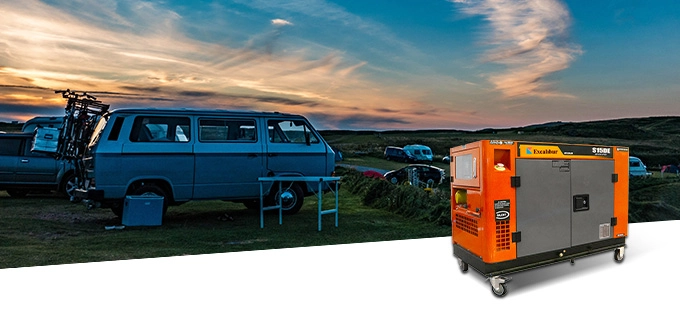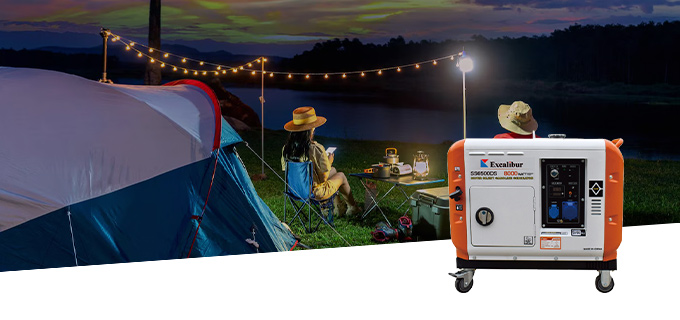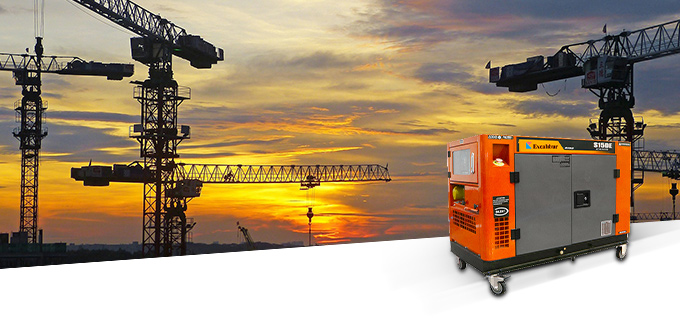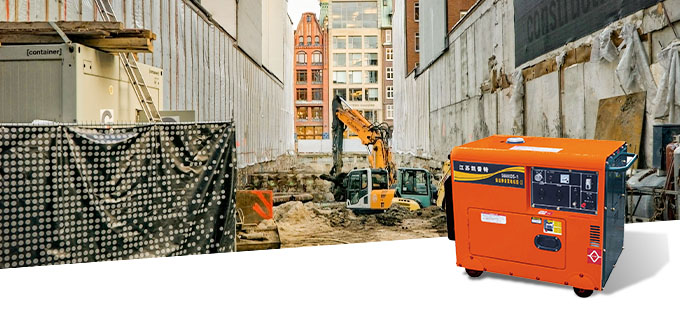Air-cooled diesel generators and water-cooled diesel generators are two common variations in diesel generator design, each with distinct advantages and considerations. The primary difference lies in the cooling system employed to dissipate the heat generated during the combustion process. Understanding the characteristics of air-cooled and water-cooled diesel generators is crucial for selecting the most appropriate option based on specific applications and requirements.
Air-Cooled Diesel Generators
Cooling Mechanism
Air-cooled generators dissipate heat using ambient air. The generator has a series of fins or blades on the engine and sometimes on the generator head, allowing air to flow over the surfaces and carry away heat.
Design and Structure
- Simplicity: Air-cooled generators are generally simpler in design, with fewer components compared to water-cooled counterparts. This simplicity contributes to easier maintenance and potentially lower initial costs.
- Compact Size: The absence of a water-cooling system often results in a more compact and lightweight generator, making air-cooled models suitable for portable and space-constrained applications.
Maintenance and Durability
- Ease of Maintenance: Air-cooled generators are often easier to maintain due to their simpler design. Routine tasks such as cleaning the cooling fins and checking airflow are more straightforward.
- Durability: The simplicity of the design can contribute to enhanced durability in certain environments. Air-cooled generators are often preferred in locations where water availability is limited or where freezing temperatures can pose a risk to water-cooled systems.
Temperature Sensitivity
- Temperature Limitations: Air-cooled generators may experience temperature limitations, especially in hot climates or under heavy loads. High ambient temperatures can reduce their cooling efficiency.
- Overheating Risk: Prolonged operation at high temperatures may increase the risk of overheating, affecting performance and potentially shortening the generator’s lifespan.
Water-Cooled Diesel Generators
Cooling Mechanism
Water-cooled generators utilize a closed-loop system where water circulates through the engine and a separate heat exchanger or radiator. The water absorbs heat from the engine and is then cooled by a fan or another means before returning to the engine.
Design and Structure
- Complexity: Water-cooled generators are generally more complex in design due to the inclusion of a cooling system with additional components such as a water pump, radiator, and hoses.
- Larger Size: The water-cooling system often results in a larger and heavier generator. While this can limit portability, it also allows for sustained operation at higher loads.
Maintenance and Durability
- Maintenance Requirements: Water-cooled generators may have more maintenance requirements, including checking and changing coolant, inspecting hoses, and ensuring the proper functioning of the water pump.
- Durability: The closed-loop system of water-cooled generators can contribute to more stable operating temperatures, potentially extending the lifespan of the engine and other components.
Temperature Sensitivity:
- Consistent Performance: Water-cooled generators typically offer more consistent performance across a range of temperatures. They are less affected by extreme ambient conditions, making them suitable for continuous use in various climates.
- Reduced Overheating Risk: The cooling efficiency of water-cooled systems is generally more reliable, reducing the risk of overheating even under heavy and prolonged loads.
Choosing Between Air-Cooled and Water-Cooled Generators
Application Considerations
- Portable Applications: Air-cooled generators are often preferred for portable applications due to their compact size and simplicity.
- Continuous Operation: Water-cooled generators are well-suited for continuous and heavy-duty applications where consistent performance and reduced temperature sensitivity are critical.
Environment and Climate
- Limited Water Availability: In locations with limited water availability or where freezing temperatures are a concern, air-cooled generators may be a more practical choice.
- Extreme Climates: Water-cooled generators are suitable for extreme climates, including very hot or very cold conditions, where maintaining consistent temperatures is essential.
Maintenance Preferences
- Ease of Maintenance: If simplicity and ease of maintenance are top priorities, air-cooled generators may be the preferred choice.
- Stable Performance: For those prioritizing stable performance and potentially longer intervals between maintenance tasks, water-cooled generators offer advantages.
In conclusion, the choice between air-cooled and water-cooled diesel generators depends on specific requirements, preferences, and the intended application. Air-cooled generators offer simplicity, ease of maintenance, and suitability for portable use, while water-cooled generators excel in providing stable performance under continuous and heavy-duty conditions. Careful consideration of factors such as environmental conditions, maintenance preferences, and power demands will guide the selection process, ensuring that the chosen generator meets the unique needs of the application.




